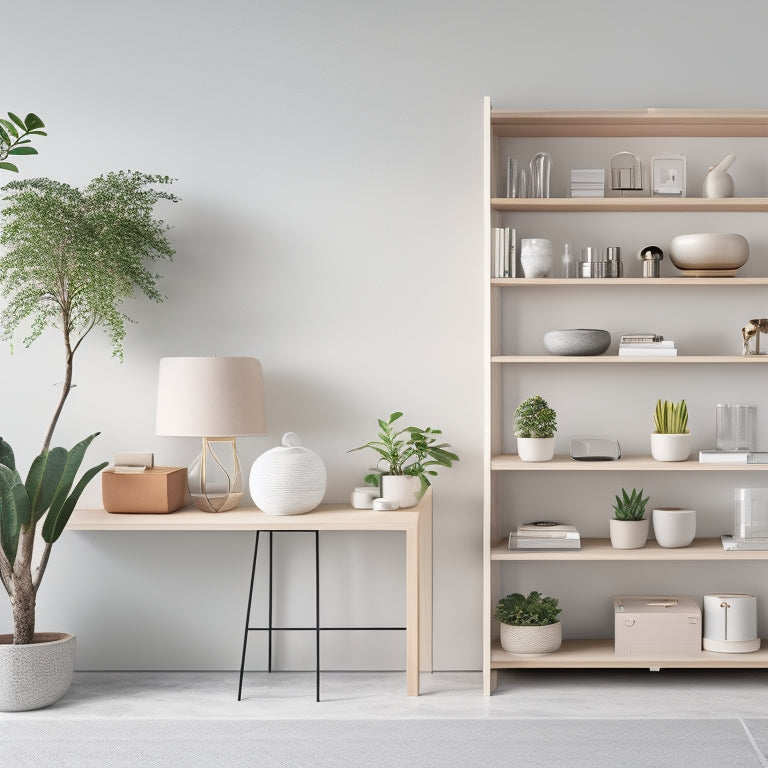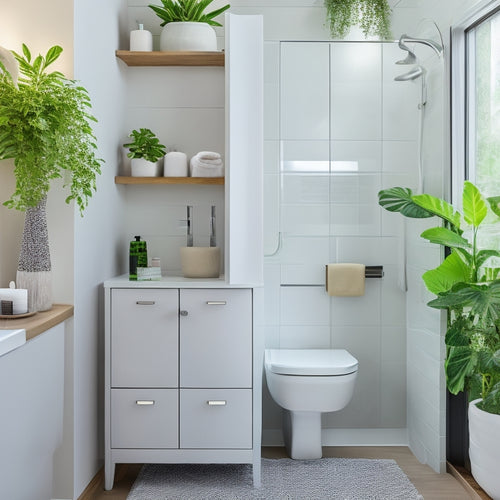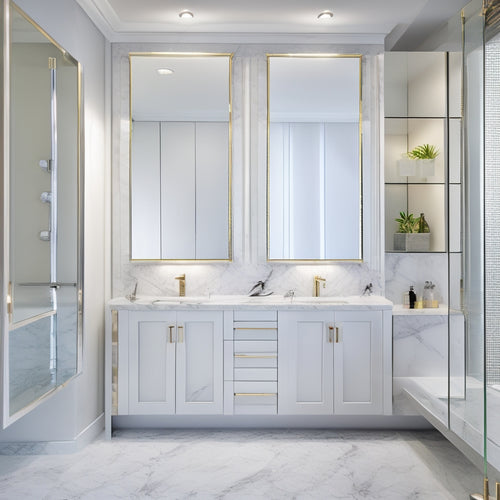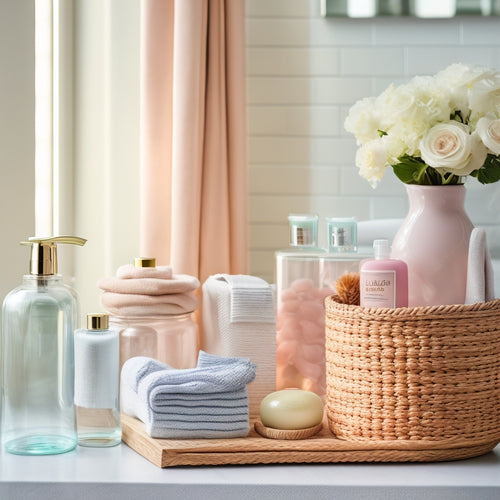
What Makes a Shelving System Truly Functional?
Share
You create a truly functional shelving system by customizing it to your unique space, prioritizing smart storage for essential items, and choosing durable materials that can withstand humidity. Adjustable shelves and easy installation guarantee flexibility and efficiency. Maximizing vertical space with innovative systems like carousels or tiered shelving also helps. Finally, consider the style and aesthetic appeal to align with your brand identity. By balancing these factors, you'll create a shelving system that optimizes your space and workflow. As you design your ideal system, you'll uncover more ways to fine-tune its functionality.
Key Takeaways
• A shelving system is truly functional when it is customized to fit specific dimensions and features, taking room layout and obstructions into account.
• Smart storage planning prioritizes easy access points for frequently used items and optimizes compact item placement for maximum storage.
• Durable materials like stainless steel or aluminum ensure the shelving system withstands humidity and corrosion, making it functional in various environments.
• An adjustable and flexible design allows for easy reconfiguration of storage space to adapt to changing needs and varying load capacities.
• Tool-free assembly and simple instruction guides enable hassle-free setup and adjustments, ensuring a functional and efficient storage solution.
Customization for Unique Spaces
When designing a shelving system for your unique space, you'll want to consider the specific dimensions and features of the area to guarantee a seamless integration. This means taking into account the room's layout, doorways, and any obstructions that could impact the shelving system's functionality.
Corner solutions, for instance, can help maximize storage in tight spaces, while room dividers can create separate areas within an open-plan room.
To guarantee a customized fit, take precise measurements of the area, including the width, length, and any obstacles like pipes or electrical outlets. This will enable you to create a shelving system that works in harmony with your space, rather than trying to force a generic solution into place.
Smart Storage for Essential Items
When designing your shelving system, you'll want to prioritize smart storage for essential items, ensuring they're always within reach.
By incorporating easy access points, you'll save time and effort when retrieving frequently used items.
Compact item placement is also key, allowing you to maximize storage capacity while keeping your space organized and clutter-free.
Easy Access Points
You can maximize your shelving system's functionality by designating easy access points for frequently used items, keeping them within effortless reach to streamline your workflow. This guarantees that you can quickly grab what you need, when you need it, without wasting precious time searching or maneuvering through cluttered shelves.
To create effective easy access points, consider the following strategies:
| Zone | Solution |
|---|---|
| Corners | Corner solutions, such as carousel units or rotating bins, to maximize dead space and provide easy access to items |
| Middle Shelves | Shelf dividers to separate frequently used items, keeping them organized and easy to grab |
| Top Shelves | Sliding baskets or bins to store less frequently used items, keeping them out of the way but still accessible |
Compact Item Placement
By strategically allocating compact storage spaces for essential items, you can free up valuable shelf space and guarantee that critical supplies are always at your fingertips. This is particularly important for frequently used items that you need to access quickly, such as office supplies, tools, or medical equipment. By designating a specific area for these items, you'll avoid clutter and make sure that everything has its designated place.
Effective corner utilization is key to maximizing storage capacity. Consider installing corner shelves, baskets, or carousels to capitalize on often-wasted space. Shelf dividers can also help separate and organize items, preventing them from getting jumbled or lost.
Durability in Humid Environments
Humid environments can wreak havoc on shelving systems, causing materials to degrade and compromising their structural integrity. You need a shelving system that can withstand the moisture and humidity. That's where durability comes in. A truly functional shelving system must be designed to resist the corrosive effects of humidity.
To achieve this, look for shelving systems made from rust-proof materials, such as stainless steel or aluminum. Additionally, consider shelving systems with moisture-resistant coatings that prevent water from seeping into the material. This guarantees that your shelving system remains sturdy and reliable even in humid environments.
Here's a comparison of different materials and their durability in humid environments:
| Material | Durability in Humid Environments |
|---|---|
| Steel | Low (prone to rust) |
| Stainless Steel | High (resistant to corrosion) |
| Aluminum | Medium (can corrode, but slower than steel) |
| Wood | Low (prone to rot and decay) |
Adjustable Shelving for Flexibility
Flexible storage options are a must-have in today's fast-paced environments, and adjustable shelving systems are designed to adapt to your changing needs. You need a shelving system that can keep up with your evolving storage requirements.
With adjustable shelving, you can easily reconfigure your storage space to accommodate different sizes and types of items. This flexibility is especially important when you have varying load capacities to take into account. For instance, you may need to store heavy boxes one day and lighter items the next. Adjustable shelving allows you to adjust the shelf height and spacing to guarantee efficient storage and maximize your space.
Another significant advantage of adjustable shelving is its ability to facilitate shelf conversion. You can easily convert shelves from one type of storage to another, such as from storing boxes to displaying products. This versatility is invaluable in fast-paced environments where storage needs can change rapidly.
Easy Installation and Assembly
When you're setting up a shelving system, you want the process to be hassle-free and efficient.
That's why you'll appreciate a system that requires tool-free assembly, making it easy to get started right away.
With simple instruction guides, you'll be able to assemble your shelving system quickly and effortlessly.
Tool-Free Assembly Required
You'll appreciate shelving systems that guarantee no tools for assembly, as this feature eliminates the frustration of searching for the right screwdriver or wrench, simplifying the installation process. With tool-free assembly, you can focus on getting your shelving system up and running quickly, without wasting time and energy on complicated assembly.
This Quick Fix approach guarantees that you can get back to what matters most - maximizing your storage space and optimizing your workflow.
Tool-free assembly also means you can make adjustments and modifications on the fly, without having to hunt down specific tools. This flexibility is particularly useful when you need to reconfigure your shelving system to accommodate changing storage needs.
Simple Solutions like this take the hassle out of assembly, allowing you to focus on more important tasks. By choosing a shelving system that requires no tools for assembly, you'll be up and running in no time, with a functional and efficient storage solution that meets your unique needs.
Simple Instruction Guides
With simple instruction guides, you're just a few steps away from a fully assembled shelving system, as clear directions and visual aids streamline the installation process. You'll appreciate the ease of assembly, thanks to intuitive guidance that eliminates guesswork.
| Component | Assembly Step | Visual Aid |
|---|---|---|
| Shelf | Attach to frame | |
| Frame | Assemble legs | |
| Back panel | Attach to frame | |
| Drawer | Install slides | |
| Hardware | Tighten screws |
Clear instructions and visual tutorials make sure that you understand each step, reducing the risk of mistakes. You'll be confident in your ability to assemble the shelving system, even if you're not a DIY expert. The result? A sturdy, functional shelving system that meets your needs, without the frustration of unclear instructions. By providing a seamless assembly experience, simple instruction guides empower you to take control of your shelving system's installation.
Maximizing Vertical Space Usage
By strategically positioning shelves and storage units, you can effectively double or triple your available storage capacity by making the most of your facility's vertical space. This is particularly important if you have high ceilings, as installing tall shelving units can help you capitalize on this often-wasted space.
Corner utilization is also essential, as these areas can easily become dead zones if not properly utilized. Consider installing carousel shelving or rotating storage units to maximize the use of these areas.
Additionally, consider implementing a tiered shelving system, where shelves are stacked vertically to maximize storage capacity. By doing so, you can greatly increase your storage capacity without taking up more floor space. This is especially useful in facilities with limited floor space, where every inch counts.
Style and Aesthetic Appeal
Your shelving system's style and aesthetic appeal can greatly influence the overall ambiance of your facility, making it important to ponder the visual aspects of your storage solution. As you design your shelving system, consider the style that aligns with your brand identity and the atmosphere you want to create.
For instance, if you're going for a rustic charm, you may opt for wooden shelves with a distressed finish. On the other hand, if you want to evoke coastal vibes, you can choose shelving units with a light, airy feel and a touch of nautical flair.
When selecting the style of your shelving system, think about the overall aesthetic you want to achieve. Do you want your storage solution to blend seamlessly into the background, or do you want it to be a statement piece? Consider the color scheme, materials, and textures that will complement your facility's décor.
Frequently Asked Questions
How Do I Ensure My Shelving System Is Earthquake-Resistant?
To guarantee your shelving system is earthquake-resistant, you'll want to install seismic anchors to secure it to the wall and use reinforced frames that can withstand intense shaking, giving you peace of mind.
Can I Install Shelving Systems on Uneven or Sloping Floors?
You can install shelving systems on uneven or sloping floors by using floor leveling techniques and slope adjustment mechanisms to secure stability and prevent collapse, guaranteeing a secure and functional storage solution.
Are Shelving Systems Available With Built-In Cable Management?
You'll be pleased to know that many shelving systems come with built-in cable management features, offering sleek cable organization and cord concealment, keeping your workspace tidy and efficient, and letting you focus on what matters most.
Can I Use a Shelving System to Create a Room Divider?
"Divide and conquer" your space by using a shelving system as a room divider, creating a functional barrier that defines areas without blocking views, and enhances your room aesthetic with a space savvy solution.
Are There Shelving Systems Designed for Outdoor or Patio Use?
'When selecting a shelving system for outdoor or patio use, you'll want to prioritize weather resistance and rust protection to guarantee durability. Look for systems with powder-coated or galvanized frames and waterproof materials to withstand the elements.'
Related Posts
-

Waterproof Cabinet Storage for Small Bathrooms
Waterproof cabinet storage can revolutionize your small bathroom by providing effective organization while resisting ...
-

Contemporary Mirrored Bathroom Cabinets for Homeowners
As you reimagine your bathroom, consider a contemporary mirrored cabinet that echoes your unique style, from sleek mo...
-

Organize Your Bathroom With Stylish Labels
Effortless bathroom organization begins with stylish labels that establish a sense of order, making it easy to find w...


